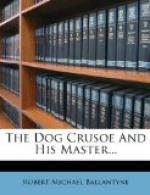The old bull that our travellers discovered had evidently been long engaged with his ferocious adversaries, for his limbs and flesh were torn in shreds in many places, and blood was streaming from his sides. Yet he had fought so gallantly that he had tossed and stamped to death dozens of the enemy. There could not have been fewer than fifty wolves round him; and they had just concluded another of many futile attacks when the hunters came up, for they were ranged in a circle round their huge adversary—some lying down, some sitting on their haunches to rest, and others sneaking about, lolling out their red tongues and licking their chops as if impatient to renew the combat. The poor buffalo was nearly spent, and it was clear that a few hours more would see him torn to shreds and his bones picked clean.
“Ugh! de brutes,” ejaculated Henri.
“They don’t seem to mind us a bit,” remarked Dick, as they rode up to within pistol shot.
“It’ll be merciful to give the old fellow a shot,” said Joe. “Them varmints are sure to finish him at last.”
Joe raised his rifle as he spoke, and fired. The old bull gave his last groan and fell, while the wolves, alarmed by the shot, fled in all directions; but they did not run far. They knew well that some portion, at least, of the carcass would fall to their share; so they sat down at various distances all round, to wait as patiently as they might for the hunters to retire. Dick left the scene with a feeling of regret that the villanous wolves should have their feast so much sooner than they expected.
Yet, after all, why should we call these wolves villanous? They did nothing wrong—nothing contrary to the laws of their peculiar nature. Nay, if we come to reason upon it, they rank higher in this matter than man; for while the wolf does no violence to the laws of its instincts, man often deliberately silences the voice of conscience, and violates the laws of his own nature. But we will not insist on the term, good reader, if you object strongly to it. We are willing to admit that the wolves are not villanous, but, assuredly, they are unlovable.
In the course of the afternoon the three horsemen reached a small creek, the banks of which were lined with a few stunted shrubs and trees. Having eaten nothing since the night before, they dismounted here to “feed,” as Joe expressed it.
“Cur’ous thing,” remarked Joe, as he struck a light by means of flint, steel, and tinder-box—“cur’ous thing that we’re made to need sich a lot o’ grub. If we could only get on like the sarpints, now, wot can breakfast on a rabbit, and then wait a month or two for dinner! Ain’t it cur’ous?”




